
原标题:保藏 | 优异的文书是怎样的?2019年哈佛优异文书集锦
华联留学·十五年专业团队·圆学子留学梦
每年哈佛校报都会挑选10个当年入学重生的优异请求文书在其网站,并附有点评,而且推荐人写出了为什么能感动自己,从这些优异文书中,能够总结出一些比较好的写作方法和讲故事的逻辑,再结合自己的文书写作,也许会有一个质的提高,期望对我们有所协助。
眼下请求季现已紧锣密鼓的敞开,早申的同学现已着手文书写作和修正,今日挑选出4篇哈佛优异文书比如,期望这些优异的文书能给我们带来新的启示。
留意:这些文书除了单个隐私细节删减外,尽量确保了学生提交时的原文,包含一些或许存在的语法错误。
第一篇
学生:Sandra
布景:
State: Massachusetts, USA
High School: Public school, 306 students in graduating class
Ethnicity: Asian
Gender: Female
GPA: 3.95 out of 4.0 SAT / ACT: n/a
SAT Subject Tests Taken: n/a
Extracurriculars: Model United Nations president, Working to Help the Homeless president, Belmontian (community service club) secretary, Speech and Debate founder and president
Awards: AP National Scholar, Belmont High School Book Award, Belmont Latin Book Award, high honor roll
Major: Psychology
ESSAY
"Ut Italiam laeti Latiumque petamus"
"Sandra, would you mind reading the next few lines and translating them for us?"
The professor glanced at me, a kind glimmer in his bespectacled eyes. I gulped. I was in a classroom of eighteen, five of whom were high school Latin teachers. And I was supposed to recite and translate Livy's Ab Urbe condita — with elisions! After fumbling through a few words and mistaking a verb for a noun, I finished the first sentence. I skimmed the second line, looking for the main verb. Singular. I searched for a singular noun and pieced the two together. Then, I noticed an accusative and added it as a direct object. As I continued, a burst of exhilaration shot through my body. My eyes darted across the page, finding a verb, a noun, and objects. I reached the end of the passage and grinned, relief pulsing in my veins.
"Very good!" The professor beamed at me before selecting his next victim.
A few months ago, I never would have imagined myself sitting in Harvard's Boylston Hall this summer for six hours a week, cherishing the ancient literature of Rome. Even though the professor decided I was eligible for the course despite not taking the prerequisite, I was still nervous. I worked hard in the class, and it reminded me just how much I love the language.
Translating has always given me great pleasure and great pain. It is much like completing a jigsaw puzzle. Next, I look for phrases that connect the entire clause — does this adjective match this noun? Does this puzzle piece have the right shape? The middle of the sentence is the trickiest, full of convoluted dependent clauses, pieces colored ambiguously and with curves and edges on all four sides. I am sometimes tangled in the syntax, one of the worst feelings in the world. After analyzing every word, I try to rearrange the pieces so they fit together. When they finally do, I am filled with a satisfaction like no other. Translating forces me to rattle my brain, looking for grammatical rules hidden in my mind's nooks and crannies. It pushes my intellectual boundaries. No other language is as precise, using inflection to express gender, number, and case in just one word. When I pull apart a sentence, I am simultaneously divulging the secrets of an ancient civilization. Renowned scholars are telling the stories of their time through these words! No other language is as meticulous. Every line follows the same meter and the arrangement of every word is with a purpose. The story of Pyramus and Thisbe includes a sentence where the word "wall" is places between the words "Pyramus" and "Thisbe" to visually show the lovers' separation. Translating is like life itself; the words are not in logical order. One cannot expect the subject of a sentence to appear at the beginning of a clause, just like one cannot plan the chronology of life. Like the delayed verb, we do not always know what is happening in our lives; we just know it is happening.
When translating we notice the nouns, the adjectives, and the conjunctions just like we see the people, senses, and connections of our lives. However, we often do not know what we are doing and ask ourselves the age-old question: Why are we here? Perhaps we are here to learn, to teach, to help, to serve, to lead, or just to live. We travel through life to decide what our purpose is, and it is that suspense and our unknown destinies that make the journey so irresistibly beautiful. I feel that same suspense and unknown when I translate, because I am beautifully struggling to unlock a past I know very little of. It is unbelievably exhilarating.
Thus, I question why others consider Latin a dead language. It is alive in all of the Western world. The Romance languages of French, Spanish, and Italian all have Latin origins. Without Latin, I would not be able to write this essay! It is alive in the stories it tells. You may see an apple and associate it with orchards, juice, pie, and fall. When I see an apple, I think of the apple of discord thrown by Eris that ultimately caused the Trojan War. This event, albeit destructive and terrifying, leads to the flight of Aeneas and eventually, his founding of Rome.
I study Latin for its rewarding return, incredible precision, intellectual challenge, rich history and culture, and deep influence on our world. I study Latin to show others how beautiful it is, to encourage the world that it should be valued. I study Latin to lead our society, like Aeneas did, toward a new city, a new dawn where everyone appreciates a mental trial of wits, everyone marvels at a vibrant past, and no one wonders whether Latin is dead or not.
点评
What is most striking about Sandra's essay was not the fact that she was taking a class alongside high school Latin teachers, or that she was taking a summer class at Harvard. Rather, it was how in-depth Sandra went into her thought process when translating Latin. It became clear from the vivid detail with which she described her translating process that she takes it rather seriously, and it is always a pleasure to read application essays that make such passion clear.
That said, there are times where Sandra's writing appears to deliberately make something engaging when there is no need. For example, “One cannot expect the subject of a sentence to appear at the beginning of a clause, just like one cannot plan the chronology of life” seemed to be an intentionally poetic sentence made to fit Sandra's claim that “translating is like life itself.” Overall, the simile works, but you should not feel forced to make dramatic claims in your essay. If you write about something that you are passionate about, that should naturally become clear in the way you write.
第二篇
学生:Kevin
布景:
State: New Jersey, USA
High School: Private day school, 130 students in graduating class
Ethnicity: Asian
Gender: Male
GPA: 4.0 out of 4.0 SAT / ACT: R: 770, W: 750, Math 800
SAT Subject Tests Taken: Math 2, Chem, US History
Extracurriculars: Varsity Soccer, Orchestra, Finance organization
Awards: Cum Laude Major: Applied Math
ESSAY
I stood frozen in the produce aisle at ShopRite, wondering which of the five varieties of oranges to buy. Valencia, blood orange, organic, Florida navel – what were the differences? When I asked my mom which variety she was looking for, she responded curtly, “It’s your choice. Pick what you want.” The thing was, I didn’t know what I wanted.
For my parents, this level of freedom – even in the orange section of the grocery store — is somewhat unique to the United States. The lingering policies of the Cultural Revolution in 1970s China dictated life choices for my parents; growing up in poverty, their families’ sole concern was putting food on the table. As a result of economic disadvantage, higher education became my parents’ life goal. “If I didn’t make it to college,” my dad told me, “I would have been trapped in that godforsaken village for the rest of my life” (only one-tenth of his high school ever made it). My parents didn’t have a choice: my mom’s entire life revolved around studying, and my dad was spanked into shape at home. Sports, music, or entertainment were out of the question – my parents’ only option was to work hard and dream of a choice in America.
The miraculous thing is that my parents, having no freedom of choice for the better part of twenty years, still had the vision to grant me choice in the United States. Unfortunately, this is not common, even in our beloved land of opportunity. All I have to do is talk to my closest childhood friends - children of other Asian-American immigrants – to see the glass walls that cultural and familial expectation have erected around their lives. For some of them, playing the piano is an obligation, not a hobby, and medical school is the only career option.
Oddly enough, I had always felt a bit left out when I was younger – why weren’t my parents signing me up for American Math Competitions and middle school summer research programs, when all my friends were doing them? I’ve come to realize, though, that having the choice to do the things I’m interested in brings out an enthusiasm I can explore passionately and fully. My many hobbies – playing soccer with our neighbor in my backyard, fiddling around with Mendelssohn on my violin, or even talking to my friend about our latest stock picks – all have come from me, and I’m forever grateful to my parents for that.
The contrast between my parents’ lives and mine is shocking. In the United States, I have so many paths available to me that I sometimes can’t even choose. I don’t even know what kind of oranges to buy, yet oranges – or any other fruit - were precious delicacies to my dad as a child. I can dream of attending a school like Harvard and studying whatever I want, whether it be math, economics, or even philosophy or biochemistry – a non-existent choice for my parents, who were assigned majors by their universities. I can even dream of becoming an entrepreneur, which I see as exploration and self-destiny in its purest form. I can be sure that wherever my true passions take me, my parents will support the choices that I make, as they have for seventeen years.
Most importantly, though, I value that Harvard, with its centuries-long devotion to educating the full person, fosters the same sense of choice for its students that I have come to so deeply appreciate in my parents. I am exhilarated to have the freedom to define my own academic journey and, looking forward, for this upcoming four-year odyssey to lay the groundwork for a lifetime of exploration. For me, thankfully, it’s all possible - but only because of the sacrifice and vision of my parents.
点评:
Kevin begins his essay with an anecdote, a tried and true method of grabbing readers’ attention. Through the colorful imagery of choosing oranges in the store, Kevin begins to construct a theme of self-direction.
References to his parents' past show Kevin’s appreciation for their struggles as well as his broader awareness of global issues. This contextualizes not only his application, but also his mindset. We see Kevin reflect on his childhood, his initial mental perturbation about not being like other children finally reconciled with his understanding of his unique opportunity. Kevin further shows his self-awareness of his freedom to pursue his own interests — a strong choice, as many colleges desire intellectually curious students.
Kevin closes his essay with a return to his anecdote about choosing images in the store, a full-circle imagery method which helps to underscore his essay's theme. He makes clear that he would make the most of his college education, and just as importantly, that he appreciates the values of the school to which he's applying. Kevin ends his essay on an uplifting, mature note, reflecting what kind of student he would be on campus.
第三篇
学生:Laura
布景:
State: California, USA
High School: Public High School, 400 students in graduating class
Ethnicity: Asian
Gender: Female
GPA: 4.8 out of 4.0
SAT / ACT: Reading 740, Math 800, Writing 800
SAT Subject Tests Taken: Mathematics Level 2, U.S. History
Extracurriculars: Nonprofit Regional Director, U.S. Senate Page Program, Conference Founder and Director, Chair of local Junior Commission, Math Program Coach
Awards: Hearst Foundation Scholarship Recipient, Coca-Cola Scholars Program
Major: Political Science / Economics
ESSAY
I’m a bit of a grandma. I don't wear horn rimmed spectacles, nor perch on a rocking chair, and I certainly wish I carried hard candies in my backpack. However, I do enjoy baking: butter sizzling as it glides across heated metal like a canoe across a glassy lake; powdered sugar fluttering through the air like glitter from a confetti cannon. Some consider themselves math, literature, or history nerds. I rifle through cookbooks, browse the internet for ingenious new recipes, and revel in this year’s birthday gift: a copy of “Bread Illustrated.”
My greatest achievement in elementary school was not the perfect score on a spelling test, but the first time I mastered a batch of cookies that didn’t bear a rigidity comparable to steel. To my parents’ bewilderment, I dismissed Barbies, yo-yo’s, and jump ropes in favor of a wire whisk: It was love at first sight.
Why do I bake? Sometimes it’s to thank a friend or reconnect with former colleagues, employers, and teachers. Just as often, it’s the intricate processes involved. Creating the exacting liaison between eggs and flour to create a pâte à choux is, for me, a form of meditation. And sometimes I bake to reflect and even gain insight into my other interests.
Baking pastries for my next Junior Commission meeting, I ruminated on my interviews with officers and local homeless regarding their direct experiences with human trafficking in my own community. I recalled a police detective telling me, “For a youth isolated from family and friends, it doesn’t take much to accept the exploitation because he believes trafficking is his only chance of survival. I remember thinking, “Except that your body has to be sold like a box of cereal at Safeway?” This inspired my exhibit that was presented at high schools in my county, in which a figure, made up of barcodes, stands silhouetted against a black background.
Then there was the time my political interests literally gave me food for thought. As a Senate page, I welcomed Senators and staff back from their Independence Day recess with choux à la crème, that perfect French amalgam of wheat, egg, butter and air we call cream puffs. I had cherry-picked the ingredients from a local farmer’s market, because local and organic is more than just a trend for me; it means contributing to the reduction of food miles and supporting small businesses rather than Big Agra. Ironically, activists that day chose to protest an aggressively lobbied pro-GMO bill by showering the Senate floor with dollar bills. Senators and staff brushed them off of their jackets while gingerly stepping around them to navigate the room.
But the elephant in the room wasn’t the litter of currency, but the senators who paid more attention to corporate lobbyists than the protesters exposing their corruption. It deepened my perspective on how politics intersects our lives, farm to table. Yet, I’ve realized that when I feel empowered to advocate for a cause, I need to remember how the audience — legislators, for example — might view both my side and the opposing side. Sometimes they see us both as intruding groups. Other times, there are unseen advantages to acting in agreement with one side over the other or coming to a compromise.
If, as M.F.K Fisher said, “First we eat, then we do everything else,” then baking is an avenue through which I have connected with people, causes and even intellectual pursuits. But the greatest gift that baking offers me is the responsibility to share. With this, I have realized an innate priority: to turn my talents, whether in the kitchen or an advocacy meeting, into tools to improve the welfare of others. My goal is to employ my compassion, intellect, and creativity into a career in public service. As much as I sometimes feel like a grandma, I also know a lot of grandmothers who happen to run our political system.
点评:
Laura opens with a unique opening line, sure to catch the eye of an admissions officer. She proceeds to draw upon compelling and specific imagery, which grounds the reader in her life while adding authenticity and depth to her interest in baking. Referring to her first successful batch of cookies as a moment of pride in her childhood, Laura sets herself apart from peers who may have chosen to focus on other interests.
Through citing baking as a way to connect with others, Laura shows that she sees herself as part of a greater community — something which admissions officers appreciate seeing. Further, Laura sets the stage for an exploration of baking as a form of meditation, showcasing her thoughtful nature, as she writes that “creating the exact liaison between eggs and flour... is a form of meditation.”
Writing that baking is a way to “gain insight into my other interests” is a segue into fleshing out her other interests — something which done poorly can read as artificial, but here naturally flows with the essay. We see Laura consider the less fortunate in her community as she bakes, showing rather than telling how she sees baking as a form of meditation. While the second to last paragraph walks the line between reciting a resume and maintaining the momentum of her story, the line "how politics intersects our lives, farm to table," clinches its greater point as a reflection on the impact of politics on everyone's daily lives.
Laura closes with a quote, a tactic which could read as artificial with a cliche choice. However, her quote speaks to the specific intersection of food and a greater purpose, elevating the themes of her essay. She concludes by connecting her passion for baking with the greater world, underscoring how her passion for baking unifies her mindset, compassion for others, and goals for the future.
第四篇
学生:Valerie
布景:
Gender: Female
GPA: 4.2 out of 4.0
SAT / ACT: Reading 750, Math 660, Writing 790
SAT Subject Tests Taken: U.S. History, French, Spanish
Extracurriculars: yearbook editor in chief, student government representative, varsity crew captain, Vegetarian Club leader
Awards: National Hispanic Scholar Award, high school high honors, language award
Major: Linguistics
ESSAY
Languages have played a central role in my life. I have studied a variety of languages, to varying degrees — but always in the name of my greater goal, which is to understand people — to truly comprehend what lies beneath the surface: How does a culture conceive of itself? what can we learn about how the Japanese based on formality of address? What can be said about the Germans, whose language requires the verb appear at the end of a sentence? Maybe not much, but without the knowledge of the language, the possibility of real understanding is impaired. My interest in linguistics — psychology as well — derives from this belief: there is an underlying structure to all language, and through the study and comprehension of this structure, there can be a mutual understanding.
Beyond the underlying structure, words themselves have a deep and rich history, and their usage is a form of beauty in itself. It was my father who opened my eye to this truth — who taught me to love words for their stories and to appreciate etymology. It began as a friendly contest between us, but for me, appreciation soon became full-fledged adoration that was only encouraged by my study of Latin. I began drawing connections I had previously missed between words I use every day, and I found myself spending hours in front of the computer looking for sites to aid me in my discoveries. One of my favorite discoveries (and an apt one to share with you) is the word hedera.
I happened upon hedera when I noticed the similarity among the words apprehend, aprender, and apprendre, in Spanish and French, respectively. It was clear, judging by the orthography and definitions, that these words shared a Latin root, but in my studies, never had I come across such a word. Next thing I knew, I had the following on my hands: apprentice, comprehend, prehensile, apprehensive. What relationship exists between one who is learning a trade and a sense of foreboding? The answer lay within the etymologies, which led to hedera, the Latin word for ivy. once suffixes had been stripped away, the remaining word was always -hendere. Alone, the word means virtually nothing; it was contrived from hedera as a verb form to convey a sense of grasping. What better to do so than ivy, a plant known for its tenacity? I could not help but admire the ivy which had embedded itself into the foundations of language.
Language is all about meaning and understanding, but to grasp the true meaning of language, one must look beyond the surface of the sentence to the structure, and even beyond that to the meaning and histories of the words themselves. Language, therefore, is my passion because it is the study of understanding.
点评:
The strength of Valerie’s essay lies, unsurprisingly, in her adept use of language to string together sentences as well written as they are communicative. Valerie’s writing is uncharacteristically advanced for her age: It is free of the attempts at poetic flourish that often appear in personal statements and manages to showcase her extensive vocabulary without using ten-dollar words. As Valerie’s puts forward, words and language are the tools she commands best; her essay is proof of this.
As for its content, this essay successfully exhibits its author's intellectual curiosity by parsing through the reasons why she loves linguistics and then demonstrating her learning process by parsing an actual word. And yet, this exercise causes the writer to stray from her initial discussion of how linguistics helps her better understand cultures and people, a wildly intriguing concept that ultimately doesn't get much airtime here.
Beyond that, this essay could exhibit more about its author as an individual. Though Valerie’s alludes to a playful relationship with her father, this is all we get in the way of a glimpse into her personality. At 475 words, this essay is well under the 650-word limit. A more colorful introduction, some insight into how Valerie’s love of linguistics shapes her interactions with others, or a more personal conclusion could liven up what is already a sound argument for the writer's keen intellect.
因为篇幅约束,今日发送四篇文章。
原文来自哈佛校报
责任编辑:

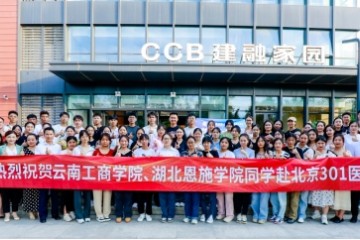 筑梦起航,医路向前——中国新高教集团举办2024届毕业生赴中国人民解放
筑梦起航,医路向前——中国新高教集团举办2024届毕业生赴中国人民解放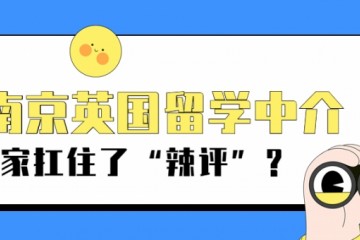 南京英国留学中介筛选指南,谁家扛住了“辣评”?
南京英国留学中介筛选指南,谁家扛住了“辣评”?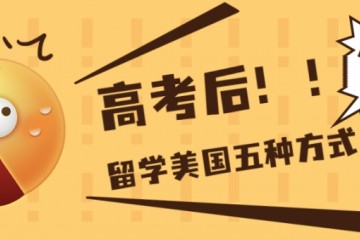 SOS ! 高考后申请美国本科来得及,但是这些事情你不能放过!
SOS ! 高考后申请美国本科来得及,但是这些事情你不能放过! 天津传媒学院无终艺术馆揭幕开馆
天津传媒学院无终艺术馆揭幕开馆 ACAA聚焦数字科技,为行业发展注入新活力
ACAA聚焦数字科技,为行业发展注入新活力 港澳台青年文化嘉年华在蓉举办
港澳台青年文化嘉年华在蓉举办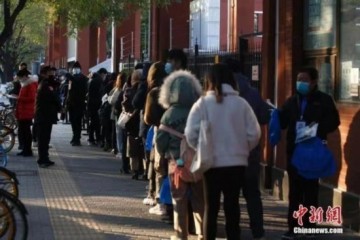 2023年度国考即将开考这些事项考生要了解
2023年度国考即将开考这些事项考生要了解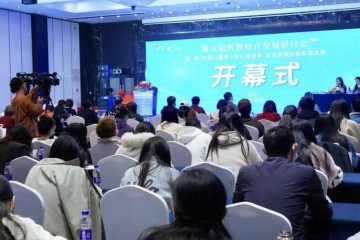 医教结合研讨会深度探讨孩子学习困难心理健康教育问题
医教结合研讨会深度探讨孩子学习困难心理健康教育问题